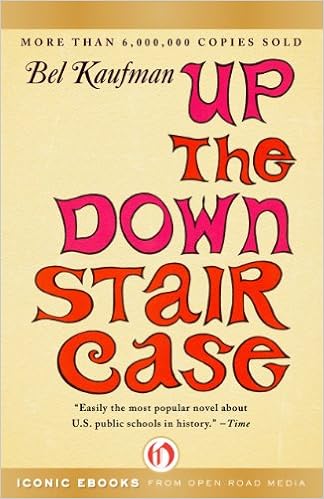Everyone says that the first year teaching is the hardest. "Everyone" doesn't exaggerate. It's true. My first year, I cried at the end of nearly every day. My homeroom was a mess, four of them got expelled throughout the year. Teaching literature dismayed me. Half the time I felt like I was pouring love into a endless void. The powers that be assigned my the lit mag even though I had no background in publishing whatsoever and then filled it with kids who had no interest in writing or reading. I was miserable.
I think the only thing that kept me from quitting at the end of the year was that stubborn streak of mine that crops up from time to time. (I have a strongly held belief that any job deserves two years of trial, among other things it keeps one's resume from looking a fright)
Ryan, my much suffering (he convinced me to try teaching) at-the-time fiance suggested that I try reading Up the Down Staircase. He's a pretty smart guy. He knows that I often process complicated emotions and ideas through reading. Up the Down Staircase is about a first year English teacher in a New York City public school. There's clear crossover there. So, I picked up the book for the first time, 9 years ago while on a plane to Maine to visit my family over the Winter Holidays.
By the end of the flight, I was hyperventilating while having one hell of a panic attack.
It wasn't that the book was bad; it was that it was way, way too real. The first 50 pages are about the first week or so of classes and they felt like my whole first semester. It was like seeing my anxiety fictionalized and made tangible. And part of that was the devastating thought: if it has always been this way, then it will never get better.
Needless to say, I had to put the book down unfinished. Years went by, teaching got better. (There are, if fact, many rewards. "Everyone" is right about that too) Ryan and I married and had Thomas. Ryan, from time to time, suggested that I try reading Up the Down Staircase again. I avoided it though. My first try left a deep impression. However, I couldn't ignore that my husband, who doesn't read much as a rule, would pick up Up the Down Staircase every couple of years and reread it. That says a lot to me about a book.
So, 9 years later, I picked it up to try again.
This time the opening disastrous homeroom scene is hilarious - because it's true. The interdepartmental memos remind me of emails I've seen, and the student work is reminiscent to the things my kids write. It used to be horrifying; now it makes me chuckle. So, Ryan was right, but boy was his timing off.
It's a pretty brilliant book and deserved its fame. Very few people can pull off epistolary novels these days. I can only think of two (three if you count a sequel) worth reading. I worry though, that Kaufman's work is in danger of losing context. The message stays relevant but by the time I read it, it was already 50 years old. Many of the details surrounding the action have changed. We don't pass memos around anymore; we email, chat, or text. I barely remember mimeos from my years in primary school; copy machines are essentially the same idea though. The computer has replaced a lot of the clerical work in the sense that we do much less handwriting. The forms all still exist though in digital format or have been replaced by different bureaucracy. It seems like a small thing to worry about, but those small details can be a barrier.
I hope someone publishes an annotated edition. I think that anyone thinking about teaching should read this. . . long before setting foot in the classroom. Yes, the beginning can be horrifying, but the end explains why sane, rational people still choose to teach even with all the awful soul killing minutia and heartbreaking students. It would have been good to get a glimpse of the pay-off ahead of time.

No comments:
Post a Comment